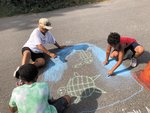STEM Advantage campers recently organized a local clean up and fundraiser for Cranston’s Stillhouse Cove and Charlestown’s Kettle Pond after observing a collection of washed up plastic …
This item is available in full to subscribers.
We have recently launched a new and improved website. To continue reading, you will need to either log into your subscriber account, or purchase a new subscription.
If you are a current print subscriber, you can set up a free website account by clicking here.
Otherwise, click here to view your options for subscribing.
Please log in to continue |
|





STEM Advantage campers recently organized a local clean up and fundraiser for Cranston’s Stillhouse Cove and Charlestown’s Kettle Pond after observing a collection of washed up plastic water bottles and other trash in the waterway behind the Park View Field Marie C. Mancuso Athletic Complex. More than 20 fourth through sixth grade campers and counselors went to the stream to observe the waterway but left with the desire to help the environment by not tolerating litter.
Statewide STEM Advantage Coordinator Caitlyn Blankenship said after the kids detected the litter, they shouted “we need to do something” in outrage and went back to Park View Middle School where they assigned jobs and implemented a project plan. They made keychains, tiles with drawings that raised awareness to littering, T-shirt bags and lemonade – all of which were sold Friday at Stillhouse Cove.
For the past six weeks, about 45 campers in grades K through sixth have been part of the STEM Advantage RI program which was created by Mystic Aquarium’s Sea Research Foundation; the camp runs from 8 a.m. to 3 p.m. Monday through Friday at Park View Middle School.
In the World of Water program, campers looked at their community’s water and performed simple water quality tests while determining turbidity and whether the area was a fresh/salt body of water.
Ayana Melvan, senior director of strategic partnerships for mission programs at Mystic Aquarium, brought STEM Advantage to Cranston and added that the water monitoring kids complete comes from a national program known as Earth Echo. When the kids test the water, the data is sent to researchers and helps them understand the area’s water quality.
According to Katie Cubina, senior vice president of missions programs at Mystic Aquarium, STEM Advantage has six programs consisting of eight to 10 activities and include field work and field trips. The programs include training sessions for facilitators and pre and post tests for the kids to gauge the program’s impact. She said the aquarium is honing in on a model that resonates with BIPOC youth across communities. Their multimedia team develops curriculum modules around STEM and conservation that get kids excited to learn; she mentions it as disguised learning.
Melvan said STEM Advantage allows kids to be hands-on and minds-on learners while having fun at the same time. The camp encourages individuals to be environmental stewards and understand that access to clean water, soil and air is directly connected to health.
“People forget the power that young people produce,” Melvan said. “They care – they just need to be given the information and then look at them go.”
Melvan added that sometimes, people are going a million miles a minute that they forget everyone and everything is connected one way or another.
On Aug. 5, STEM Advantage celebrated the last day of camp with a local clean up and showcase of what they learned. Eighteen first through third graders tagged storm drains, writing slogans such as “don’t pollute” in chalk on the asphalt; the group also participated in a trash clean up. Meanwhile, counselor Lynn Morales’ kindergartners talked about learning about the stages of the butterfly and how they raised their own butterflies and released them near the school’s plants. The seven campers learned about the butterflies’ food source by growing their own milkweed.
“The growth I’ve seen in six weeks is amazing,” said Morales, who loved working with the kids.
She said little kids are like sponges – soaking up information. Morales has been a teacher for 28 years and spent the last eight years at Park View Middle School as a sixth grade American History teacher.
She became involved in the STEM Advantage program after meeting Blankenship who would be using Morales’ classroom for the summer programs. Morales asked what they’d be focusing on and decided it would be something fun to do – she added that she has triplets leaving for college in the fall and that the extra money wouldn’t hurt.
Throughout the weeks, kindergarteners focused on endangered species including elephants, which campers learned were hunted for their tusks because of the ivory; campers then made ivory soap and carved it to look like elephants.
This is the first time STEM Advantage has run a kindergarten program – which Blankenship said went well. One of the first things Morales and campers discussed was what a scientist looked like. While the program introduced campers to STEM opportunities, it showed kids that they were scientists through their exploration. Morales said when they visited Stillhouse Cove, the kids used buckets and nets for finding sea creatures and were taught that these were tools, not toys – adding that at that young age, everything is a toy.
Kindergartners also made bird feeders out of toilet paper rolls by putting peanut butter on the cardboard and rolling it in bird seed. Morales said they also practiced writing their names, counting and adding in order to prepare them for the upcoming school year.
Blankenship said the kindergartners came to camp with a wide range of skills and abilities since not all had been to preschool. She added that in the beginning of the season, the campers all had to hold each other’s hands to stay together but – as Friday’s trash pick up showed – campers were now able to pick up trash without much micromanaging.
STEM programs allow youth to explore different career opportunities and learn from experts in the field who look like them. Melvan said STEM is a nice pathway for kids to go from being mentees to mentors. Individuals who have gone through the program will help out the younger generations by encouraging them. Cranston’s STEM program had eight peer mentors this year.
Cubina said often what’s exciting is finding kids who may not excel in math and science in school but find their place and passion for learning in the STEM Advantage program.
Melvan said one former STEM Advantage student, Avery Hart, came out of Cranston’s program and is now studying biology at URI. She recalled another student, Aaron Short, who completed his two free years at CCRI and will attend Fisher College for a communications major, is looking to use his degree for something STEM-based through social and print media.
Both Hart and Short have been mentors for campers.
Melvan said the aquarium wants to continue these efforts but it can be difficult to get these initiatives funded; they already have a waiting list with Newport and Woonsocket wanting these programs.
Cubina added that the program has been so successful by word of mouth and they are looking at how they can expand the program.
There are 10 cities and towns with more than 20 sites participating in STEM Advantage this year. Melvan said they recently wrapped up a tribal youth program that mixed the indigenous tribe’s cultural knowledge and STEM knowledge.
Comments
No comments on this item Please log in to comment by clicking here